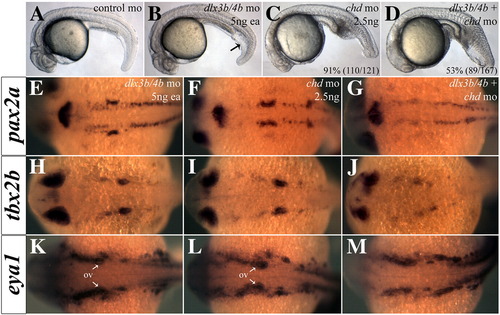Fig. 2
- ID
- ZDB-FIG-090113-10
- Publication
- Esterberg et al., 2009 - dlx3b/4b are required for the formation of the preplacodal region and otic placode through local modulation of BMP activity
- Other Figures
- All Figure Page
- Back to All Figure Page
|
Depletion of Chd reveals anti-BMP function of Dlx3b/4b. (A–D) Intermediate cell mass of the tail is increased in Dlx3b/4b morphants (B), reminiscent of a ventralization phenotype. Injection of a low dose of chd-mo results in a mild V1 ventralization phenotype (C). Knockdown of Chd and Dlx3b/4b increases the severity of ventralization (D). (E–M) Heightened BMP activity in Chd/Dlx3b/4b triple morphant embryos severely reduces otic expression of eya1 (E–G), pax2a (H–J), and tbx2b (K–M), while leaving expression in surrounding tissue intact. (A–D) are lateral views and (E–M) are dorsal views, with anterior to the left. All embryos are 24 hpf. |
| Genes: | |
|---|---|
| Fish: | |
| Knockdown Reagents: | |
| Anatomical Term: | |
| Stage: | Prim-5 |
| Fish: | |
|---|---|
| Knockdown Reagents: | |
| Observed In: | |
| Stage: | Prim-5 |
Reprinted from Developmental Biology, 325(1), Esterberg, R., and Fritz, A., dlx3b/4b are required for the formation of the preplacodal region and otic placode through local modulation of BMP activity, 189-199, Copyright (2009) with permission from Elsevier. Full text @ Dev. Biol.

